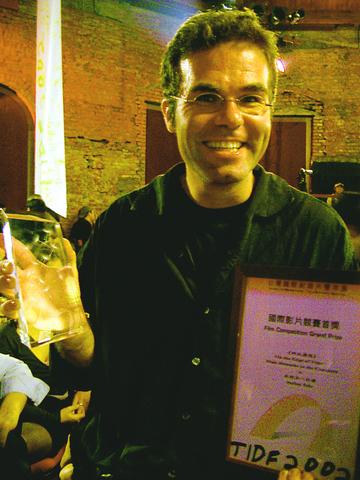The Taiwan International Documentary Festival ended yesterday with an award ceremony handing out prizes for outstanding film and video documentary works.
German filmmaker Stefan Tolz took away the top prize, the Grand Prize, in the international film competition category, with his film, On the Edge of Time: Male Domains in the Caucasus, winning a cash prize of NT$300,000.

PHOTO: YU SEN-LUN, TAIPEI TIMES
The two second prize awards were given to Israeli director David Fisher's Love Inventory and Danish film Family by Phie Ambo-Nielson and Sami Martin Saif, each winning a cash prize of NT$100,000.
Taiwanese director Tang Shiang-chu's (
"In this film festival, we seem to have walked through the Caucasus, Siberia, temples in Taipei and an island in Bolivia. And we have learned how to fish in Norway, to lead a life as a homeless person in Buenos Aires and to climb the mountains of Hsinchu. ? This is the great thing about this festival," said jury member Alan Rosenthal referring to the films in the international film competition.
"We had a very smooth meeting. All the awards were decided without much disagreement," added Lee Daw-ming (
The winning film, On the Edge of Time: Male Domains in the Caucasus depicts a multi-ethic male-dominated culture and a simple lifestyle that seems to have been forgotten by time.
The jury gave this film the top award because of the enormous difficulties that had been overcome while shooting in the remote Caucasus region.
Tolz expressed great excitement at receiving the award for a film he said had previously been rejected by a German TV station. He was now able to prove them wrong.
"I have to thank the people of the Caucasus for opening their hearts to my camera," Tolz said as he got ready to celebrate his victory.
"My original idea was inspired by the millennium. I wanted to find a place where people live in a different time, without mobile phones or computers."
David Fisher's Love Inventory, a film digging into the filmmaker's own family secrets, took a second place Merit Award. Although the film has already picked up prizes in Berlin and at the Israeli Academy Awards, Fisher said this award was special to him. "I remember the warm reception I received here and the good questions from the audience. Also, I'm happy to show an Israeli film that is not about war or national historical problems," said Fisher.
In fact, the filmmakers found more than just a passionate audience for their films. They also found a market, with PTS, Taiwan's public TV network, expressing interest in some of the works.
In the international video competition category, the Grand Prize was given to Katorga by Russian filmmaker Evgeny Solomin, winning NT$100,000.
The two Merit Prizes are given to Zhao Liang (
Taiwanese filmmaker Zero Chou's (周美玲) Poles Extremity (極端寶島) and Finnish filmmaker Maria Lappalainen's On Edge were given Special Mention prizes in the video awards.
The two Taiwan Awards, designed to recognize local filmmakers, were given to Tseng Wen-chen (
The NETPAC Award, an award given by the Network for the Promotion of Asian Cinema, was given to Korean film Sky-blue Hometown by Kim So-young, about a Russian Korean painter in Uzbekistan. The film also won Best Documentary at the Pusan International Film Festival in 2000 and Yamagata International Documentary Film Festival in 2001.

Taiwan has next to no political engagement in Myanmar, either with the ruling military junta nor the dozens of armed groups who’ve in the last five years taken over around two-thirds of the nation’s territory in a sprawling, patchwork civil war. But early last month, the leader of one relatively minor Burmese revolutionary faction, General Nerdah Bomya, who is also an alleged war criminal, made a low key visit to Taipei, where he met with a member of President William Lai’s (賴清德) staff, a retired Taiwanese military official and several academics. “I feel like Taiwan is a good example of

March 2 to March 8 Gunfire rang out along the shore of the frontline island of Lieyu (烈嶼) on a foggy afternoon on March 7, 1987. By the time it was over, about 20 unarmed Vietnamese refugees — men, women, elderly and children — were dead. They were hastily buried, followed by decades of silence. Months later, opposition politicians and journalists tried to uncover what had happened, but conflicting accounts only deepened the confusion. One version suggested that government troops had mistakenly killed their own operatives attempting to return home from Vietnam. The military maintained that the

Taipei Mayor Chiang Wan-an (蔣萬安) announced last week a city policy to get businesses to reduce working hours to seven hours per day for employees with children 12 and under at home. The city promised to subsidize 80 percent of the employees’ wage loss. Taipei can do this, since the Celestial Dragon Kingdom (天龍國), as it is sardonically known to the denizens of Taiwan’s less fortunate regions, has an outsize grip on the government budget. Like most subsidies, this will likely have little effect on Taiwan’s catastrophic birth rates, though it may be a relief to the shrinking number of

Since its formation almost 15 years ago, Kaohsiung rock band Elephant Gym (大象體操) has shattered every assumption about contemporary popular music, and their story is now on screen in a documentary titled More Real Than Dreams. It’s an unlikely success story that says a lot about young people in Taiwan — and beyond. For a start, their sound is analog. In the film, guitarist Tell Chang (張凱翔) proudly says: “There is no AI in our sound.” His sister, bass player KT Chang (張凱婷) is the true frontwoman — less for her singing abilities than for her thunderous sound on the instrument. Fast like